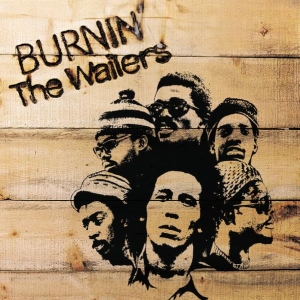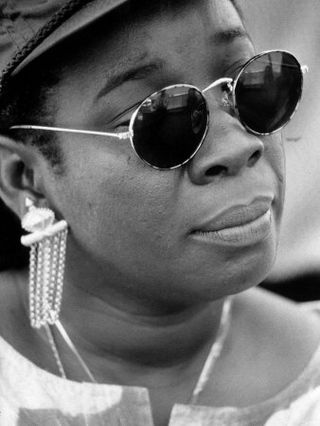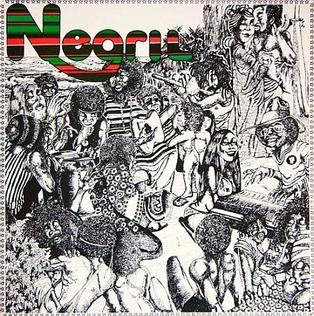
Burnin' is the sixth album by Jamaican reggae group the Wailers, released in October 1973. It was written by all three members and recorded and produced by the Wailers in Jamaica, contemporaneously with tracks from the Catch a Fire album with further recording, mixing and completion while on the Catch a Fire tour in London. It contains the song "I Shot the Sheriff". It was the last album before Marley, Peter Tosh and Bunny Wailer decided to pursue solo careers, while continuing their local releases through their company Tuff Gong Records. A commercial and critical success in the United States, Burnin' was certified Gold and later added to the National Recording Registry, with the Library of Congress deeming it historically and culturally significant.

Catch a Fire is the fifth studio album by the reggae band The Wailers, released in April 1973. It was their first album released by Island Records. After finishing a UK tour with Johnny Nash, they had started laying down tracks for JAD Records when a disputed CBS contract with Danny Sims created tensions. The band did not have enough money to return to Jamaica, so their road manager Brent Clarke approached producer Chris Blackwell, who agreed to advance The Wailers money for an album. They instead used this money to pay their fares back home, where they completed the recordings that constitute Catch a Fire. The album has nine songs, two of which were written and composed by Peter Tosh; the remaining seven were by Bob Marley. While Bunny Wailer is not credited as a writer, the group's writing style was a collective process. For the immediate follow-up album, Burnin', also released in 1973, he contributed four songs. After Marley returned with the tapes to London, Blackwell reworked the tracks at Island Studios, with contributions by Muscle Shoals session musician Wayne Perkins, who played guitar on three overdubbed tracks. The album had a limited original release under the name The Wailers in a sleeve depicting a Zippo lighter, designed by graphic artists Rod Dyer and Bob Weiner; subsequent releases had an alternative cover designed by John Bonis, featuring an Esther Anderson portrait of Marley smoking a "spliff", and crediting the band as Bob Marley and the Wailers.

Bob Marley and the Wailers were a Jamaican ska, rocksteady and reggae band. The founding members, in 1963, were Bob Marley, Peter Tosh, and Bunny Wailer.
Steppin' Razor may refer to:
Joseph Benjamin Higgs was a reggae musician from Jamaica. In the late 1950s and 1960s he was part of the duo Higgs and Wilson together with Roy Wilson. He was a popular artist in Jamaica for four decades and is also known for his work tutoring younger musicians including Bob Marley and the Wailers and Jimmy Cliff.

Alfarita Constantia Marley is a Cuban-born Jamaican singer, songwriter and entrepreneur. She is the widow of reggae legend Bob Marley. Along with Marcia Griffiths and Judy Mowatt, she was a member of the reggae vocal group the I Threes, the backing vocalists for Bob Marley and the Wailers.

Soul Rebels is the second studio album by the Wailers, their first album to be released outside Jamaica. The Wailers approached producer Lee "Scratch" Perry in August 1970 to record an entire album, and the sessions took place at Randy's recording studio above Randy's Record Mart at 17 North Parade in Kingston, Jamaica, until November. First issued in the UK by Trojan Records in December 1970, the album has since been re-released several times on several different labels. Perry's production is sparse and haunting, only featuring guitar, bass, drums, electronic organs, and vocals with no horns or other embellishments.

Aston Francis Barrett, often called "Family Man" or "Fams" for short, is a retired Jamaican musician and Rastafarian.
"Wake the Town" is a reggae song recorded by Jamaican toaster U-Roy in 1970. It was U-Roy's first big hit and one of the songs that established U-Roy as the grandfather of the modern deejay phenomenon. It also helped create dancehall style in Jamaica.
The Smile Jamaica Concert was a reggae concert held on 5 December 1976, at the National Heroes Park in Kingston, Jamaica, aimed at countering political violence. Bob Marley had agreed to perform but two days before the concert he was shot in his home. He recovered and with The Wailers played a 90-minute set for the 80,000 people in attendance.

Robert Nesta Marley was a Jamaican singer, musician, and songwriter. Considered one of the pioneers of reggae, his musical career was marked by fusing elements of reggae, ska, and rocksteady, as well as his distinctive vocal and songwriting style. Marley's contributions to music increased the visibility of Jamaican music worldwide, and made him a global figure in popular culture. Over the course of his career, Marley became known as a Rastafari icon, and he infused his music with a sense of spirituality. He is also considered a global symbol of Jamaican music and culture and identity, and was controversial in his outspoken support for democratic social reforms. In 1976, Marley survived an assassination attempt in his home, which was thought to be politically motivated. He also supported legalisation of marijuana, and advocated for Pan-Africanism.

Donald Kinsey is an American guitarist and singer, best known as a member of the Word Sound and Power Band, the reggae backing group for Peter Tosh.

Negril is an album released in 1975 from a session produced, arranged, and almost entirely composed by guitarist Eric Gale. It includes some of Jamaica's best-known musicians of the time. The album expresses Gale's fondness for the beach and natural beauty of the Jamaican seaside village Negril, which became a popular destination for tourists.
Ronnie Nasralla OD was a Jamaican record producer and businessman, best known for his work in the music industry with Byron Lee & the Dragonaires.
Delroy Washington was a Jamaican-British reggae singer best known for his releases for Virgin Records in the late 1970s.
Nathaniel Ian Wynter, also known as Natty Wailer, was a Jamaican-born musician and Rastafarian, best known for his work with Bob Marley and the Wailers, Aston Barrett and King Tubby. He is credited on recordings as Natty Wailer, Ian Winter, Ian Wynter, or Brother Ian.
The Sensations were a Jamaican vocal group which performed backing on many of the reggae hits of the late 1960s and early 1970s. Membership was fluid but centred on the original members Jimmy Riley, Cornel Campbell, Buster Riley and Aaron "Bobby" Davis.

Neville O'Riley Livingston, known professionally as Bunny Wailer, was a Jamaican singer-songwriter and percussionist. He was an original member of reggae group The Wailers along with Bob Marley and Peter Tosh. A three-time Grammy Award winner, he is considered one of the longtime standard-bearers of reggae music. He was also known as Jah B, Bunny O'Riley, and Bunny Livingston.

Winston Hubert McIntosh, OM, professionally known as Peter Tosh, was a Jamaican reggae musician. Along with Bob Marley and Bunny Wailer, he was one of the core members of the band the Wailers (1963–1976), after which he established himself as a successful solo artist and a promoter of Rastafari. He was murdered in 1987 during a home invasion.
Blackman Know Yourself is an album by the Jamaican musician Joe Higgs, released in 1990. He is credited with the Wailers Band.









